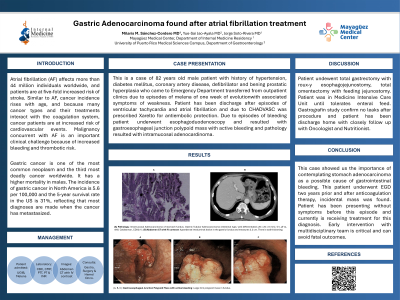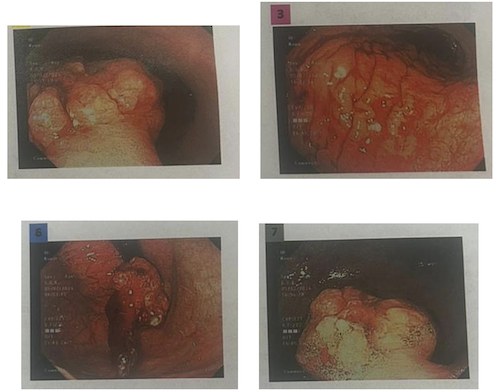Sunday Poster Session
Category: Stomach
P1666 - Incidental Finding of Silent Gastric Adenocarcinoma After Atrial Fibrillation
Sunday, October 27, 2024
3:30 PM - 7:00 PM ET
Location: Exhibit Hall E

Has Audio

Milaris Sanchez-Cordero, MD
Mayaguez Medical Center
Mayaguez, PR
Presenting Author(s)
Milaris Sanchez-Cordero, MD1, Yue-Sai Jao-Ayala, MD2, Milton Carrero-Quinones, MD1, Valerie Flores, MD1
1Mayaguez Medical Center, Mayaguez, Puerto Rico; 2University of Puerto Rico, Medical Sciences Campus, San Juan, Puerto Rico
Introduction: Atrial fibrillation (AF) affects more than 44 million individuals worldwide, and patients are at a five-fold increased risk of stroke. Cancer incidence rises with age, and many cancer types and their treatments interact with the coagulation system. Malignancy concurrent with AF is a significant clinical challenge because of increased bleeding and thrombotic risk. Gastric cancer is one of the most common neoplasms and the third most deadly cancer worldwide and has a higher mortality in males. The incidence of gastric cancer in North America is 5.6 per 100,000, and the 5-year survival rate in the US is 31%, reflecting that most diagnoses are made when the cancer has metastasized.
Case Description/Methods: This is a case of 82 years old male patient with a history of hypertension, diabetes mellitus, coronary artery disease, defibrillator, and benign prostatic hyperplasia who came to the Emergency Department and transferred from outpatient clinics due to episodes of melena after one week of evolution with associated symptoms of weakness. The patient has been discharged home after episodes of ventricular tachycardia and atrial fibrillation and, due to CHADVASC, was prescribed Xarelto to reduce the risk of stroke and blood clots. Due to episodes of bleeding, the patient underwent esophagogastroduodenoscopy (EGD), which resulted in a gastroesophageal junction polypoid mass with active bleeding and pathology resulting in intramucosal adenocarcinoma. The patient underwent total gastrectomy with roux-y esophagojejunostomy and total omentectomy with feeding jejunostomy. The patient was in the Medicine Intensive Care Unit until he tolerated enteral feed. The Gastrografin study was ordered to confirm that there were no leaks after the procedure. The patient was discharged home with a close follow-up with an Oncologist and Nutritionist.
Discussion: This case showed us the importance of contemplating stomach adenocarcinoma as a possible cause of gastrointestinal bleeding. This patient underwent EGD two years prior without evidence of a mass of this size and extension, and after anticoagulation therapy, an incidental mass was found. The patient has not presented with symptoms of gastroesophageal reflux or early satiety before this episode. He is currently receiving treatment for this diagnosis with an Oncologist. Early intervention with a multidisciplinary team is critical and can avoid fatal outcomes.

Disclosures:
Milaris Sanchez-Cordero, MD1, Yue-Sai Jao-Ayala, MD2, Milton Carrero-Quinones, MD1, Valerie Flores, MD1. P1666 - Incidental Finding of Silent Gastric Adenocarcinoma After Atrial Fibrillation, ACG 2024 Annual Scientific Meeting Abstracts. Philadelphia, PA: American College of Gastroenterology.
1Mayaguez Medical Center, Mayaguez, Puerto Rico; 2University of Puerto Rico, Medical Sciences Campus, San Juan, Puerto Rico
Introduction: Atrial fibrillation (AF) affects more than 44 million individuals worldwide, and patients are at a five-fold increased risk of stroke. Cancer incidence rises with age, and many cancer types and their treatments interact with the coagulation system. Malignancy concurrent with AF is a significant clinical challenge because of increased bleeding and thrombotic risk. Gastric cancer is one of the most common neoplasms and the third most deadly cancer worldwide and has a higher mortality in males. The incidence of gastric cancer in North America is 5.6 per 100,000, and the 5-year survival rate in the US is 31%, reflecting that most diagnoses are made when the cancer has metastasized.
Case Description/Methods: This is a case of 82 years old male patient with a history of hypertension, diabetes mellitus, coronary artery disease, defibrillator, and benign prostatic hyperplasia who came to the Emergency Department and transferred from outpatient clinics due to episodes of melena after one week of evolution with associated symptoms of weakness. The patient has been discharged home after episodes of ventricular tachycardia and atrial fibrillation and, due to CHADVASC, was prescribed Xarelto to reduce the risk of stroke and blood clots. Due to episodes of bleeding, the patient underwent esophagogastroduodenoscopy (EGD), which resulted in a gastroesophageal junction polypoid mass with active bleeding and pathology resulting in intramucosal adenocarcinoma. The patient underwent total gastrectomy with roux-y esophagojejunostomy and total omentectomy with feeding jejunostomy. The patient was in the Medicine Intensive Care Unit until he tolerated enteral feed. The Gastrografin study was ordered to confirm that there were no leaks after the procedure. The patient was discharged home with a close follow-up with an Oncologist and Nutritionist.
Discussion: This case showed us the importance of contemplating stomach adenocarcinoma as a possible cause of gastrointestinal bleeding. This patient underwent EGD two years prior without evidence of a mass of this size and extension, and after anticoagulation therapy, an incidental mass was found. The patient has not presented with symptoms of gastroesophageal reflux or early satiety before this episode. He is currently receiving treatment for this diagnosis with an Oncologist. Early intervention with a multidisciplinary team is critical and can avoid fatal outcomes.

Figure: Gastric Mass found in EGD
Disclosures:
Milaris Sanchez-Cordero indicated no relevant financial relationships.
Yue-Sai Jao-Ayala indicated no relevant financial relationships.
Milton Carrero-Quinones indicated no relevant financial relationships.
Valerie Flores indicated no relevant financial relationships.
Milaris Sanchez-Cordero, MD1, Yue-Sai Jao-Ayala, MD2, Milton Carrero-Quinones, MD1, Valerie Flores, MD1. P1666 - Incidental Finding of Silent Gastric Adenocarcinoma After Atrial Fibrillation, ACG 2024 Annual Scientific Meeting Abstracts. Philadelphia, PA: American College of Gastroenterology.
